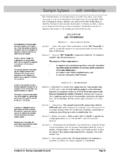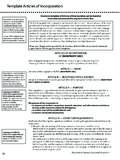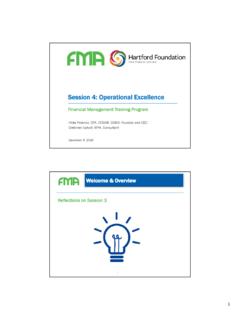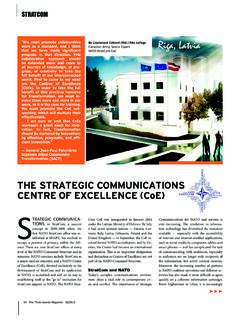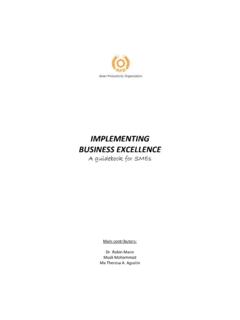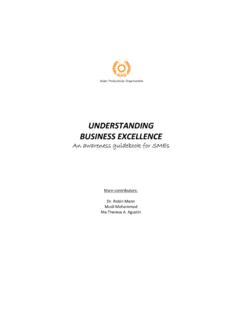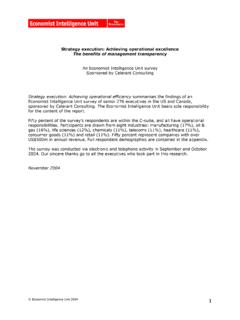Transcription of for Nonprofit Excellence - Minnesota Council of Nonprofits
1 1 Principles & Practicesfor Nonprofit ExcellenceA guide for Nonprofit staff and board membersA guide for Nonprofit staff and board membersThe Minnesota Council of Nonprofits (MCN) is a statewide association of more than 2,000 Minnesota Nonprofit organizations. Through its website, publications, workshops and events, cost-saving programs and advocacy, MCN works to inform, promote, connect and strengthen individual Nonprofits and the Nonprofit 2014 by the Minnesota Council of Nonprofits . All rights reserved.
2 No part of this publi-cation may be reproduced or transmitted in any form or by means electronic or mechanical without the written consent of the Minnesota Council of & Practicesfor Nonprofit Excellence2 IntroductionIN 1994 THE Minnesota Council OF Nonprofits (MCN) became the first state association of Nonprofits to develop a set of accountability principles and management practices. This revised edition completely up-dates those original standards while remaining true to MCN s longstanding goal of open access to our comprehensive policies for strong public account-ability.
3 The Principles and Practices for Nonprofit Excellence are based on the fun-damental values of quality, responsibility and accountability. The 11 accountability principles distinguish the Nonprofit sector from government and the business sector. The 192 management practices provide specific guidelines for individual organizations to evaluate and improve their opera-tions, governance, human resources, advocacy, financial management and fundraising. This document has three intended purposes. The first is to provide indi-vidual organizations striving for Excellence with a tool for strategic planning and operational evaluation relative to the rest of the Nonprofit sector.
4 The second is to support the growth and quality of the sector. The third is to increase public understanding of the role and contributions of the Nonprofit sector. The Principles and Practices for Nonprofit Excellence are not meant for use by funders or government to evaluate Nonprofit organizations, nor are they intended as a substitute for the wisdom of directors or trustees of individual organizations. Given some blurring of the lines between the three sectors of the economy, this document is designed to support the effective functioning of our sector by recommending specific best practices.
5 This revised edition of the Principles and Practices for Nonprofit Excellence was developed by a 37-member committee representing the diversity of Minnesota s Nonprofit community. A complete list of members can be found on page Nonprofit organization needs a strong foundation of compliance and a broad organizational awareness of laws and regulations related to fundrais-ing, licensing, financial accountability, human resources, lobbying, politi-cal advocacy and taxation. The Principles and Practices presume that each organization is in compliance with applicable laws, including Minnesota Chapter 317A (the Minnesota Nonprofit Corporation Act); relevant sections of the Internal Revenue Code; and other federal and state laws dealing with employment, occupational health and safety, and and Practices for Nonprofit Excellence Minnesotans join together throughout the state to form associations and organizations of every type.
6 The Principles and Practices for Nonprofit Excellence are of particular interest to 501(c)(3) organizations. However, the information and concepts apply broadly to all types of Nonprofit orga-nizations. Because of the sector s diversity by size, region and activity area, each organization must determine whether or not an individual practice is appropriate for its current organizations have proven essential to the vitality of communi-ties. They enrich quality of life, epitomize the highest societal values and strengthen democracy.
7 Volunteers, board members and employees become involved with a Nonprofit because of the organization s public benefit mis-sion. Therefore the continued success of Minnesota s Nonprofit organiza-tions requires broad public support and confidence. This document publicly testifies the Nonprofit sector s commitment to Excellence always for the benefit of critical role of Nonprofits in democratic societies underscores the im-portance of knowing how to form, govern and manage these organizations. The growth and progress of the Nonprofit sector depends on developing and improving this body of knowledge.
8 Since its founding by Minnesota s Nonprofits , MCN has provided research, education and technical assistance to strengthen Nonprofit management and governance. The Principles and Practices form an ongoing framework for MCN s trainings, publications and other educational materials. MCN s website also provides access to templates, samples and techniques to help organizations easily and cost-effectively implement the Principles and to Readers: Please be aware that certain words have particular meanings in this document: Must is used to describe practices required by state or federal law,and is noted with this symbol.
9 The online version of the Principles and Practices (located at ) will soon include direct web links to relevant federal and state statutes and reporting forms. Should is used to describe highly recommended practices. Constituents describes people with a stake in the success of the organization and may include members, neighbors, clients, volunteers and Updated History of the Principles and PracticesTHE Minnesota Council OF Nonprofits BEGAN THIS DOCU-MENT on Nonprofit accountability at its 1993 Annual Conference.
10 We continued to develop it through community meetings, workshops and dis-cussions throughout the state. Under the leadership of Dr. James P. Shannon and James V. Toscano, MCN joined with two organizations the Charities Review Council of Minnesota and MAP for Nonprofits to convene discus-sions on Nonprofit standards and to develop principles of sound Nonprofit management and accountability. The first draft of the Principles and Prac-tices for Nonprofit Excellence was circulated to Nonprofit and philanthropic leaders throughout Minnesota and the United States in 1994 and was ap-proved by MCN s board of directors in 2005, MCN conducted a major revision of the Principles and Practices, led by James V.

